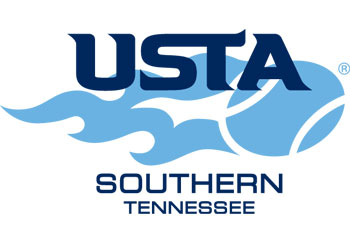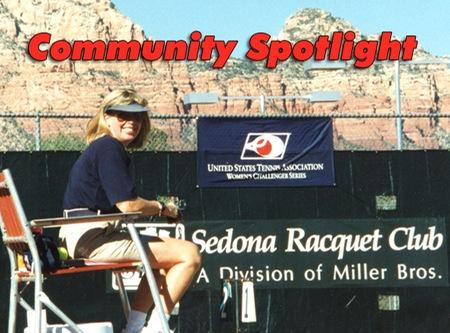
Former International Official Referees for Pros, NCAA, SEC and Vanderbilt
By Corey Nason Reese
November 13, 2014
The US Open. Wimbledon. Pan American Games. These are venues for the world’s best tennis players hoping to compete at their highest levels on some of the largest stages of their sport. Large crowds of fans gather to watch, television audiences are even bigger, year-end rankings and thousands of dollars are at stake.
Along the sidelines, however, are a few men and women who are also well trained in their field and strive to bring their professional best to advance tennis to its highest level.
They are the officials.
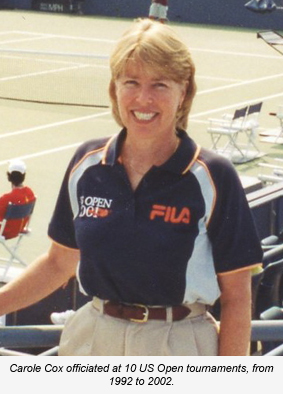 One Nashville native, Carole Cox, knows all about the pressure and the fun of the job. For more than a decade, she excelled at being an International professional tennis official who was an umpire and linesperson at these three prestigious tournaments, Davis and Federation Cup matches and many more.
One Nashville native, Carole Cox, knows all about the pressure and the fun of the job. For more than a decade, she excelled at being an International professional tennis official who was an umpire and linesperson at these three prestigious tournaments, Davis and Federation Cup matches and many more.
Chair umpires and line umpires (linespeople) travel hundreds and sometimes thousands of miles, and at this level, have worked countless tournaments. Yet, by choice, they remain largely unknown.
“In officiating, some things are black and white and others are not. A big part of officiating, no matter what the level, is how you solve problems,” Carole said. “Sometimes you have to just listen to a player who wants to tell you something and doesn’t expect an answer. On other occasions, you have to be careful not to insert yourself into the match. It’s a matter of using your best judgment.”
And while officials are paid for their time and given travel allowances, most officials don’t do it for the money. “Everyone who officiates does it because they feel they have something to offer to the game. You have to love it because there are not that many people who can make a living doing this,” she said. “I worked with other officials from around the world who came from all walks of life. The friendships and camaraderie were the greatest benefits.”
Becoming an International Official
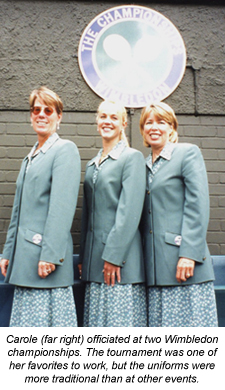 From 1989 to 2002, Carole worked at tournaments across the country and around the world, including Wimbledon (England), Olympics (Atlanta), Virginia Slims, Family Circle Cup and ATP Men’s events. She officiated in Argentina, Memphis, Hilton Head, Cincinnati, Birmingham, Indian Wells, Coral Springs and Miami – to name a few locations.
From 1989 to 2002, Carole worked at tournaments across the country and around the world, including Wimbledon (England), Olympics (Atlanta), Virginia Slims, Family Circle Cup and ATP Men’s events. She officiated in Argentina, Memphis, Hilton Head, Cincinnati, Birmingham, Indian Wells, Coral Springs and Miami – to name a few locations.
“I really enjoyed working at all the tournaments, but Wimbledon in particular is a very exciting tournament. Maybe because there’s a lot of history and because of the village itself,” she said. “But the uniforms we wore were very old fashion, with puffy sleeves and a long skirt, which weren’t the most flattering. We also wore street shoes.”
The ITF (International Tennis Federation) is the governing body for officials. Carole had attained a Bronze badge (the third highest level among International Officials) by the time she retired from officiating at the professional level after the 2002 US Open.
To earn the top badges, officials work their way up through the USTA officiating system, working at local, regional and national tournaments. They must attend an ITF school, which are held around the world. The entry international badge is white.
Carole had already been working professional tournaments, but to attain this badge, she traveled to school in Argentina. She worked as a chair umpire at the Pan American Games in conjunction with her classwork.
“Off I go to Argentina, and discover that not only am I expected to call the match in Spanish, but the classes were also in Spanish. I knew a couple of the Spanish officials, so they gave me a crash course in Spanish. I still remember ‘pelotas nuevas’ – new balls,” Carole said, laughing. “In class, the instructor would speak 15 minutes to the class and then would answer my questions in two words.”
Fortunately for her, the exam was in English and because of her previous professional experience, she passed the test and receive her white badge.
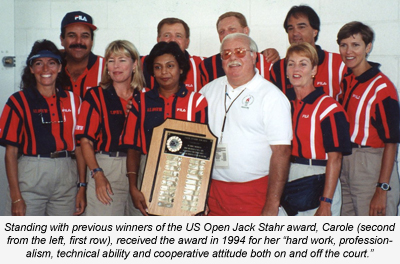 She earned her bronze badge in England in 1996 and this time, was thankful for no language barrier, she said.
She earned her bronze badge in England in 1996 and this time, was thankful for no language barrier, she said.
Carole was more than a proficient official; she was outstanding. She began working at the US Open in 1992, and in 1994, she was selected for the Jack Stahr award for her work at the tournament that year. The award is given to an umpire who is in their first three years at the US Open and “is recognized for her hard work, professionalism, technical ability and cooperative attitude both on and off the court.”
She credits an injury to helping her attain such a high level of excellence. “I was very good on the baseline and I think the reason was I had torn my knee up playing tennis one year. So while I was doing rehab, I could do nothing but baseline because I couldn’t run the lines. I became proficient because I spent many, many hours on the baseline.”
After 13 years of officiating, Carole was now traveling extensively. “In 2002, after I had called 10 US Opens, I was tired of being gone. At the level I was officiating, I was traveling three to four months every year, “ she said. “I didn’t want to give up officiating completely, so I began concentrating on the college game. I really enjoy collegiate tennis and at that level, it’s a team sport and very exciting.”
New Role as Referee and Chief Umpire: Challenger Tour and NCAA
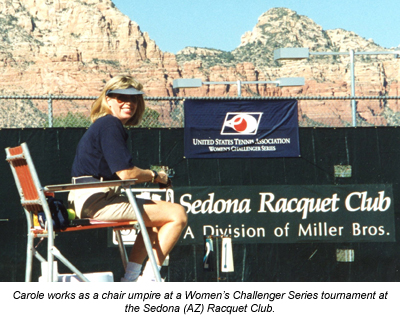 So in 2002, Carole began the next phase of her officiating career. She started working as a referee and chief umpire ¬– who oversees and assigns (and sometimes hires) all officials for matches and is responsible for making final officiating decisions.
So in 2002, Carole began the next phase of her officiating career. She started working as a referee and chief umpire ¬– who oversees and assigns (and sometimes hires) all officials for matches and is responsible for making final officiating decisions.
She continued to work at professional matches, specifically the Challenger Tour, but was now a chief umpire rather than an official. The majority of her time, however, was now spent working with collegiate tennis.
For the past 12 years, Carole has served as the referee for Vanderbilt University men’s home matches, and for the women since 2004. In addition, she has been the referee for the Women’s SEC (Southeastern Conference) Tennis Championship since 2007.
Carole has also worked as a deputy referee for the NCAA women’s tournament since the late 1990s and in 2015 will be the women’s (head) referee.
“Originally when I started working the Vanderbilt matches, there were just three officials that roved. As players got better, it began to matter more. Everyone is trying to win the NCAAs so it became required that all matches have chair umpires. We have them in the SEC. It’s the same in the Big 12 and Big 10,” she said.
Training and Evaluating Other Officials
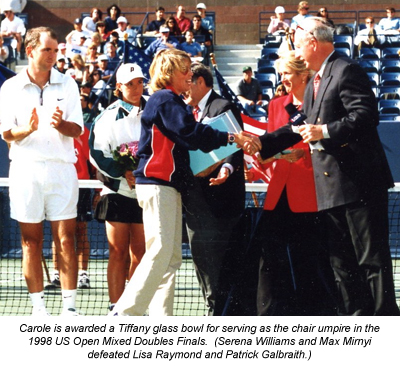 Carole greatly enjoys her work as a referee, but she also contributes to the professional work of umpiring by teaching and evaluating both the current and the next generation of officials. She travels to tournaments to assess linespersons on technique, accuracy, court demeanor and presence on court.
Carole greatly enjoys her work as a referee, but she also contributes to the professional work of umpiring by teaching and evaluating both the current and the next generation of officials. She travels to tournaments to assess linespersons on technique, accuracy, court demeanor and presence on court.
“When I came off the court from doing chairs and lines, they asked me if I would become a national trainer/evaluator. I began working at the US Open as an evaluator 10 years ago, and this past summer, (2014) I worked at the tournament for seven days. It’s fun and much less stressful than when I was officiating the event,” she said.
Officials at all levels are continually being evaluated and must recertify annually. Carole is one of a handful of instructors that teach officiating school, usually during the months of January through March. She remembered her first beginnings as an official when she volunteered at the Boy’s 16 National Clay Court championships in 1988 in Nashville, and was asked about a rule she didn’t know.
“They sent me out to watch a couple of courts. I thought, ‘I play tennis. I basically know the rules.’ But I will never forget. I was out there watching the court when the player served a first serve, the receiver called a fault on the return, and he broke a string when he returned it,” Carole said. “They looked at me and asked, ‘First serve or second serve?’ I said, ‘I don’t know, I’ll be right back.’
“I had never broken a string in my life. I quickly ran up to the desk and asked what to do. Even they had to look it up. (The server gets two serves.) It was after that experience, I thought, if I’m going to volunteer, I’d better go to a class and get certified, and learn the rules a little bit better.”








